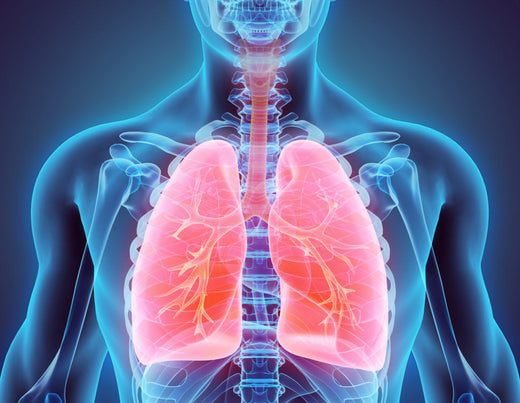Your lungs are the foundation for everything you do, from everyday activities like climbing stairs to more intense activities like sports and running. Good lung function is essential for transporting oxygen through your body, which directly affects your energy and endurance. Yet we often don’t think about how we can strengthen our lungs and keep them healthy.
In this article, you will discover what lung function exactly entails, which factors play a role in optimal breathing and how you can actively work on improving your lung health. Whether you exercise daily or are just starting a healthier lifestyle, with the right knowledge and habits you can increase your lung capacity and stay fit for longer.
Factors affecting lung function
Your lungs are exposed to a variety of influences throughout the day that can affect the health and performance of your respiratory system. By knowing which factors play a role, you can take more targeted steps to improve or maintain your lung capacity.
- Smoking: Cigarette smoke contains harmful substances that damage your lung tissue and reduce its ability to absorb oxygen.
- Air pollution: particulate matter, exhaust fumes and other pollutants can irritate your airways and affect lung function in the long term.
- Lifestyle and fitness: A lack of exercise or an unhealthy lifestyle can cause your respiratory system to work less efficiently.
- Heredity and age: Certain people are genetically more susceptible to lung disease, and lung capacity slowly decreases with age.
- Chronic conditions: Asthma, COPD, or other respiratory conditions can weaken your lungs and make breathing difficult.
Symptoms of reduced lung capacity
When your lung capacity decreases or your airways become weaker, various signs can occur that indicate a reduced function of your respiratory system. By recognizing these symptoms in time, you can take appropriate measures and help prevent further deterioration.
- Shortness of breath: you get out of breath more quickly during light exertion or even during daily activities.
- Regular coughing: especially if you have a cough for a long time, this may indicate irritation or inflammation in the airways.
- Wheezing: A whistling or squeaking sound when breathing may indicate narrowed airways.
- Fatigue and low energy: Reduced oxygen intake can make you feel exhausted more often.
- Chest or back pain: Some people experience pressing or nagging pain when their lungs are not functioning optimally.
Measuring lung capacity
One of the most common methods of measuring your lung function is spirometry. This involves blowing into a device that measures the amount of air you can inhale and exhale, and how quickly you do so. The results allow a doctor to see whether your lungs are functioning optimally or whether there is a reduced capacity.
Another way to get an impression of your lung health is, for example, via a peak flow meter, with which you measure the exhalation speed. Based on these measurements, you can make a plan together with an expert to improve or maintain your lung function.
Strengthening your lungs: how do you do that?
While you may not think about your breathing on a daily basis, there are many ways to strengthen your lungs and keep them functioning optimally. After all, your lungs are the driving force behind your energy and stamina.
So if you are now thinking: 'How can I improve my lung function?' Don't panic, because there are several ways to get started. With a few targeted changes you can increase your lung capacity, ensure better oxygen absorption and be better able to live an active and fit life.
Quit smoking
If you smoke, quitting smoking may be the single most important step you can take to improve your lung function. Tobacco smoke contains numerous harmful substances that irritate your airways and damage your lung tissue.
When you stop, your lungs can begin to recover and your breathing ability often improves within a few weeks. For example, you cough less, get out of breath less quickly and your ability to exercise increases.
However, quitting smoking can be a challenge, especially because of the addictive effect of nicotine. It is therefore wise to seek support, for example through a GP, a coach or a specialized program.
In addition, nicotine replacements or certain medications can help break the smoking habit. By combining this support with strong motivation and avoiding situations that lead to smoking, you significantly increase the chance of success. In this way, you give your lungs the space to recover and you actively work on better overall health.
Avoid exposure to air pollution
Poor air quality can put a lot of strain on your lungs and make your respiratory system more vulnerable to irritation and infection. Think of exhaust fumes, particulate matter and other harmful particles in the air.
These particles can penetrate deep into your airways, causing you to experience shortness of breath and coughing more quickly. In addition, long-term exposure to air pollution can lead to an increased risk of chronic diseases.
To protect your lungs, it is important to limit your exposure to polluted air as much as possible. For example, try to avoid busy roads during peak hours, and do not open your windows when the air quality is clearly worse (for example during periods of smog).
If you live in an area with high levels of air pollution, consider an indoor air purifier. By being mindful of the air you breathe in this way, you can better support your lungs and reduce the risk of irritation and damage.
Sports and exercise
Regular exercise and movement stimulates your respiratory muscles and increases your lung capacity. By moving, your body has to take in more oxygen and remove carbon dioxide faster.
This challenges your airways to work more efficiently, which leads to better ventilation of your lungs and can make your lungs stronger. An active lifestyle also promotes blood flow, which transports oxygen and nutrients to your muscles and organs more quickly.
In addition, sports activities with varying intensity, such as interval training or running, can help to regulate your breathing even more effectively. This allows you to gradually build up your endurance and you will notice that you get out of breath less quickly during daily activities.
It is wise to start with a low-threshold training schedule, especially if you are not used to intensive exercise. This gives your body time to adapt and prevents injuries or overload. You can easily improve your lung function by adding exercise to your habits.
Healthy food
What you eat not only affects your energy and nutritional status, but also the health and function of your lungs. Healthy nutrition supports the immune system and can help reduce inflammation in the airways. By getting enough vitamins, minerals and antioxidants, harmful substances in your body can be broken down more quickly, which contributes to better lung function.
A varied diet with plenty of vegetables, fruit, whole grains and protein sources such as legumes or lean meat can make a valuable contribution to healthy lungs.
These nutrients contribute to maintaining strong lung tissue and help your body better cope with harmful external stimuli. By consciously choosing a balanced meal, you give your lungs the best possible breeding ground to continue to perform optimally.
Lung Health Supplements
In addition to a healthy lifestyle and balanced diet, certain supplements can provide additional support for your lung function. For example, supplements that are rich in antioxidants , vitamins and minerals that can protect your immune system and lung cells from damage by free radicals.
Ingredients such as certain herbal extracts, nootropics or omega-3 fatty acids can also have a positive effect on inflammatory processes in the body.
By providing your body with the right nutrients, you promote the regeneration of lung tissue and reduce the chance of irritation or infections.
However, it is always advisable to consult a professional, such as a GP or a dietician, before adding a new supplement to your daily routine. This way you can be sure of advice that is tailored to your personal health situation and needs.
Also see: improving gut health
Do breathing exercises regularly
There are numerous breathing exercises that you can do anytime and anywhere to strengthen your lungs. For example, think of deep abdominal breathing (diaphragm breathing) and interval breathing, where you consciously pause between inhaling and exhaling. By training your breathing, you can strengthen your muscles in the chest and diaphragm, making it easier to inhale and exhale large amounts of air.
Regularly practicing such breathing techniques can not only improve your lung function, but also contribute to better stress regulation. Conscious and slow breathing has a calming effect on both body and mind.
This allows you to relax more in your daily life, while actively working on your respiratory health. Even a few minutes a day can make a noticeable difference in how deeply and efficiently you can breathe.
Prevention of lung diseases
One of the most important steps to prevent lung disease is to minimize your lung exposure to harmful influences. In addition to quitting smoking and avoiding air pollution, an active lifestyle and a healthy diet are essential.
This keeps your lungs flexible and strong, and your body better able to fight off infections. Good hygiene, such as washing your hands regularly and avoiding direct contact with people who are sick, can also help keep viruses and bacteria out of your airways.
In addition, it is wise to have your health checked regularly, especially if you notice that your breathing is deteriorating or if you are at risk due to hereditary or chronic conditions.
By identifying changes in your lung function in time, you can work with a medical professional to take appropriate measures, such as exercise therapy or additional support for your respiratory muscles. In this way, you create a solid foundation for long-term health of your respiratory system and are better protected against lung diseases.



To share:
What are adaptogens and what can they do for you?
Improve gut health